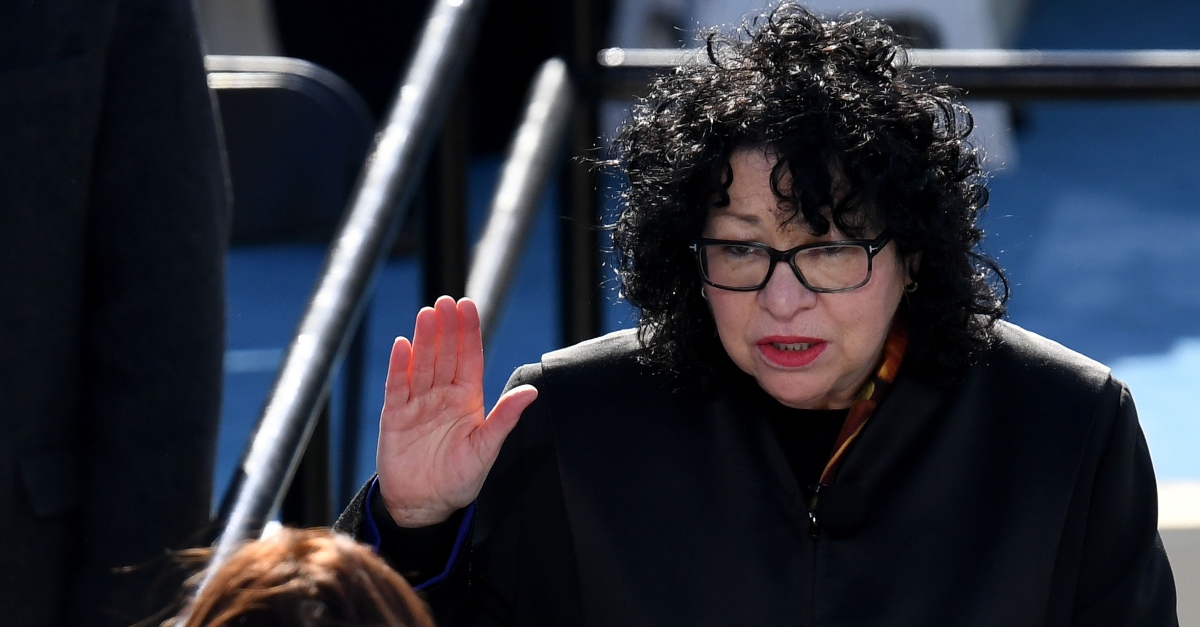
Sonia Sotomayor. (Image via Olivier Douliery/AFP via Getty Images.)
Supreme Court Justice Sonia Sotomayor on Friday rubbished an emergency application filed by a collection of New York City Department of Education employees who sought to challenge a COVID-19 vaccine mandate.
The employees asked Sotomayor to “temporarily enjoin[] the continued enforcement of the Mandate against the (less than) three percent of employees who cannot comply due to religious objection.”
Sotomayor denied the Feb. 8, 2022 application just three days after it was filed. The application was submitted to Sotomayor because she is the justice who fields incoming appeals from the circuit in which New York City sits.
The applicants told Sotomayor that they were “wrongfully suspended” from their jobs and filed an “injunction over four months ago” seeking relief. A so-called “merits panel” on the Second Circuit found that the applicants were “likely to succeed” in a First Amendment claim against the city and the school district, but the applicants argued to Sotomayor that the “lower courts continue[d] to delay providing meaningful substantive relief.” The relief requested included being “reinstated to the payroll,” among other things.
“Each holds a sincere, deeply held religious belief that prevents him or her from taking a COVID-19 vaccine,” the applicants said of themselves in 58-page document which presented the case to Sotomayor.
The educators continued by complaining of religious-based discrimination by government actors who probed the parameters of their “unorthodox” beliefs in a manner they equated with “heresy inquisitions.” They said the government litigated the case by suggesting they should mold to the mainstream views “of rabbis in another country whom they had never met” rather than the dictates of their own personal consciences. From the application at length:
The issues in this case have been thoroughly briefed, and argued now five times, in the lower courts – by Respondents’ counsel and by two teams of lawyers for Applicants, whose cases were most recently consolidated. It is indisputably clear that Respondents grossly violated the Constitution in applying their vaccine mandate. The lower courts acknowledged that the policies under which employees were suspended are “blatantly violative of the First Amendment guarantee” because they require discrimination against employees with unorthodox religious beliefs. In implementing the policy, the DOE went even further, resurrecting the unlawful practice of heresy inquisitions and zealously arguing that Orthodox Jews were bound by the pro-vaccination views of rabbis in another country whom they had never even met, and that even non-Catholic employees should be denied religious accommodation because Pope Francis and other preferred religious leaders do not support their viewpoints.
Applicant Matthew Keil, for whom the case is named, described his religious beliefs as follows:
[A]s an ordained Deacon in the Orthodox Church, Keil has spent much time and effort sojourning in monasteries, studying the Christian scriptures, and learning spirituality from monks and other religious authorities from his faith. His path of study has led him to believe that through the sacrament of communion he shares in the blood of Christ physically in his own body, and that scriptural commands not to profane God’s holy temple require him to abstain from injecting vaccines and other substances into his bloodstream. To do otherwise would cause him to be “judged by God.” As a result, he has abstained from all vaccinations in his adult life and has also declined to vaccinate any of his six children.
“Each of the Applicants has his or her own unique religious story and specific religious beliefs that require them to refuse obey the Mandate,” the document noted.
The applicants suggested another path was possible — but that school and city officials refused to take it.
“Various alternative measures can be taken short of forcing employees to submit to vaccination against their sincerely held religious beliefs,” the applicants argued. “Notably, no other school district among the state’s approximately 700 districts require, or has ever required, its teachers to be vaccinated against COVID-19. Respondents have offered no substantive evidence to establish that their employees cannot be safely accommodated, or that they even attempted to consider alternatives to suspension and termination.”
“For a year and a half before the Mandate took effect last October, Applicants were celebrated as ‘heroes’ working on the frontlines to educate children as the pandemic raged,” the educators noted. “Many caught COVID-19 and have natural immunity.”
The phrase “natural immunity” appeared only that one time in the emergency application for a writ of injunction, but the concept was explored slightly in transcripts of lower court proceedings. When one attorney brought it up, she accused a judge of “shaking your head” during the discussion and said experts would probably be needed to further explain it and citations to a few early studies about the topic.
Sotomayor refused to take the case without comment.
Read the applicants’ legal arguments below.
[Editor’s note: legal citations have been omitted from quotes in this piece. The full citations are in the embedded document.]
Have a tip we should know? [email protected]